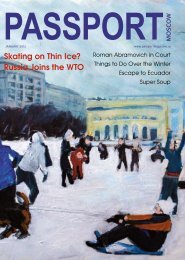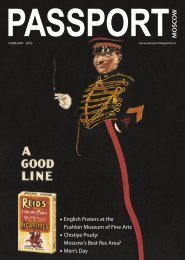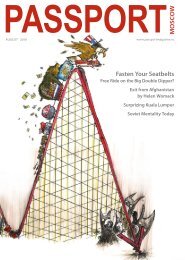Feminism in Russia - Passport magazine
Feminism in Russia - Passport magazine
Feminism in Russia - Passport magazine
Create successful ePaper yourself
Turn your PDF publications into a flip-book with our unique Google optimized e-Paper software.
him that his duty as a public servant <strong>in</strong> this unique case was<br />
to ensure conviction. Koni replied by quot<strong>in</strong>g Montesquieu:<br />
“The function of a court is not to render service but to pass<br />
judgement.” Then the Tsar summoned Koni to the W<strong>in</strong>ter Palace<br />
and suggested he “do the right th<strong>in</strong>g”.<br />
Koni was a new type of person <strong>in</strong> <strong>Russia</strong>: an educated,<br />
middle-class public servant who believed that law and<br />
proper procedure should take precedence over everyth<strong>in</strong>g,<br />
<strong>in</strong>clud<strong>in</strong>g the autocracy. The son of a theatre critic,<br />
Koni had <strong>in</strong>itially studied eng<strong>in</strong>eer<strong>in</strong>g. But, <strong>in</strong>spired by Alexander’s<br />
law reforms, he had switched to law. He wrote<br />
his dissertation on the right of self-defence, <strong>in</strong>clud<strong>in</strong>g that<br />
of people aga<strong>in</strong>st the unlawful exercise of state power. He<br />
wrote: “The authorities should not doubt the right of defence<br />
aga<strong>in</strong>st unlawful acts… They cannot demand respect<br />
for law when they themselves do not respect it.” This, of<br />
course, was the essential issue <strong>in</strong> Zasulich’s trial. In later life,<br />
Koni became one of <strong>Russia</strong>’s most dist<strong>in</strong>guished jurists. He<br />
died <strong>in</strong> 1927, still try<strong>in</strong>g to br<strong>in</strong>g respect for law to <strong>Russia</strong>,<br />
even under Soviet conditions.<br />
The trial was so dramatic that Dostoyevsky, who sat <strong>in</strong> the<br />
public gallery throughout, recycled much of it <strong>in</strong> The Brothers<br />
Karamzov. “All Petersburg” was said to have been there,<br />
<strong>in</strong>clud<strong>in</strong>g several government M<strong>in</strong>isters.<br />
Koni was too good a judge to want Zasulich acquitted.<br />
He knew she had committed a deliberate act of violence,<br />
which could have had fatal consequences. He disapproved<br />
of what he called “the vigilante mentality”. His only aim<br />
was to help establish the rule of law by ensur<strong>in</strong>g a fair trial.<br />
April 2011<br />
The Way It Is<br />
He assumed the jury would f<strong>in</strong>d her guilty. He planned to<br />
give her a light sentence which would serve as a warn<strong>in</strong>g<br />
to both sides.<br />
The “not guilty” verdict which the jury delivered after a<br />
mere ten m<strong>in</strong>utes’ deliberation was a national sensation.<br />
Even the Foreign M<strong>in</strong>ister, Pr<strong>in</strong>ce Gorshakov, was seen<br />
applaud<strong>in</strong>g <strong>in</strong> the public gallery. Zasulich was the hero<strong>in</strong>e<br />
of the hour.<br />
Her argument can be summarised <strong>in</strong> two of the sentences<br />
she uttered from the witness box: “It is terrible to raise one’s<br />
had aga<strong>in</strong>st one’s fellow man… But I couldn’t f<strong>in</strong>d any other<br />
means to direct attention to that terrible event.”<br />
This went beyond Koni: civil disobedience is one th<strong>in</strong>g;<br />
crim<strong>in</strong>al acts quite another. Zasulich posed a direct challenge<br />
to the autocracy’s method of rul<strong>in</strong>g by fear and violence.<br />
Immediately after she left the court, the St Petersburg<br />
police, act<strong>in</strong>g under orders from von Pahlen, and with the<br />
approval of the Tsar, tried to re-arrest Zasulich. With the<br />
help of supporters, she slipped away and went <strong>in</strong>to hid<strong>in</strong>g.<br />
She declared publicly she was prepared to accept any<br />
punishment a court might impose, but not an extra-legal<br />
executive diktat.<br />
The result of the trial was a general disillusionment with<br />
the court process. To the “left”, the government’s refusal to<br />
abide by the verdict showed the hypocrisy beh<strong>in</strong>d the new<br />
system of courts and juries. This was a fair charge as von<br />
Pahlen’s subequent actions showed. He asked Koni why he<br />
had permitted a “demonstration” <strong>in</strong> his court. Koni replied,<br />
“By law, a judge is not required to justify his actions to the<br />
25
















